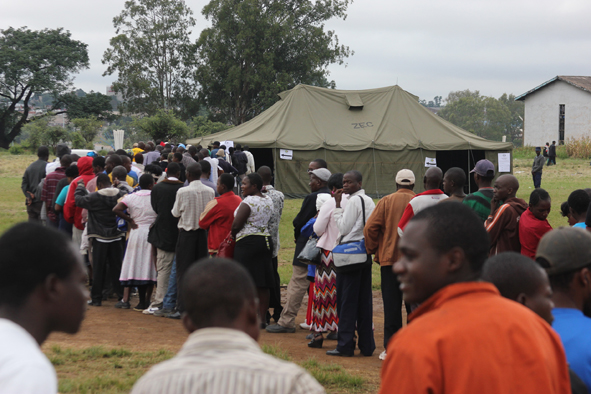
WHILE they are absolutely necessary and in fact entirely indispensable, elections clearly have disruptive tendencies for the most part.
By Omen Muza
Granted, they are a good opportunity to usher in new policy dispensations as winners seek to implement their manifestos, but it must be admitted that the period before, during and immediately after elections — usually called the election year — can be extremely tense and fraught with many forms of danger.
This, I suppose, is why elections are not the favourite time for many stakeholders. In this instalment I outline some reasons why.
The run-up to elections is generally a time when political players are hypersensitive about the level of support they enjoy or do not enjoy.
Under such circumstances, businesses will usually be wary that their genuine business initiatives may be construed or misconstrued as supportive of this party or the other. The recent case of the Coca-Cola “Crazy for Good” or “High Five Everybody” campaign featuring open palm symbols on red cans is a case in point.
Ultimately, everything comes down to who you support. Your hand is either clenched into a fist or spread into an open palm; you are either with them or you are with us. Consequently, many put genuine business projects on hold until after elections.
Elections relegate some of the most important bread-and-butter issues to the bottom of priority lists while the struggle for political power itself assumes bread-and-butter, life-and-death proportions.
- Chamisa under fire over US$120K donation
- Mavhunga puts DeMbare into Chibuku quarterfinals
- Pension funds bet on Cabora Bassa oilfields
- Councils defy govt fire tender directive
Keep Reading
Financial and human resources that would otherwise be deployed for developmental purposes are funnelled into a consumptive black hole in which political players appeal to the basic material instincts of voters in an effort to woo votes — the currency of democracy.
“Nothing of a common nature will come before the elections, when you compete it is difficult to push a common agenda. People ask who will benefit with votes for effecting a policy instead of analysing the ultimate advantages of certain policies on the economy,” Deputy Prime Minister Arthur Mutambara recently confirmed at the Zimbabwe National Chamber of commerce annual congress in Victoria Falls.
By their very nature, elections either preserve or dismantle existing power structures and dynamics, sometimes in very rapid and humiliating ways.
Former Kenyan Prime Minister Raila Odinga was recently barred from using the VIP lounge at Jomo Kenyatta International Airport and one can understand the anxiety about losing political positions and the trappings of power that come with them. Similarly, business interests aligned to certain political interests may suddenly find themselves without support — that is the way the cookie sometimes crumbles.
Some people are not great fans of elections because of their experiences with previous elections. It is not easy to forget the mayhem that occurred in the run-up to the 2008 elections and immediately after them.
Who can forget the feeling of utter resignation and despondency people experienced while waiting for election results that looked like they might never be announced? Anyone would be apprehensive if there was a chance that they could be subjected to the same level of anxiety again.
“The electorate is suffering from Post Traumatic Stress Disorder (PSTD),” declared someone going by the pseudonym “Puppet on a Chain” in response to a previous instalment of this column titled Not just elections, but proper polls.
Businesses, in particular, may be wary of elections because it is a time when they can — at short notice — be required to demonstrate their allegiance by “donating” towards the election campaign of this or that political party.
While some companies can definitely afford this benevolence, for many it is a challenge to cough up such donations at a time when most businesses are struggling to make ends meet against the backdrop of severe liquidity challenges. Puppet on a Chain prefers to call this phenomenon “the unbridled extortion that takes place in the private sector in the run up to elections”.
The uncertainty that typically accompanies the pre — and post — election period can be a corrosive agent with immense value-destroying capabilities. Already, the Bankers Association of Zimbabwe reports a $500 million dip in deposits over the past few months while the Finance minister says the economy could have shrunken by as much as 3% during first four months of the year due to political uncertainty.
Elections do not always deliver the best outcomes, especially in terms of service delivery, as residents in most towns and cities of Zimbabwe have since discovered. Instead of fulfilling the aspirations of voters for good governance, sometimes elections become nothing more than a crude means through which new people can catch the gravy train or one through which those already there can continue at the feeding trough.
Fortunately, elections also consign others to the dustbin of history as seen in the current primary elections on both sides of the political divide.
Is election time your favourite time? If not, tell us why.







